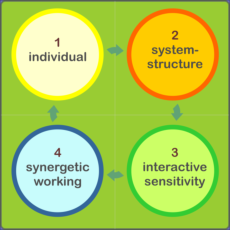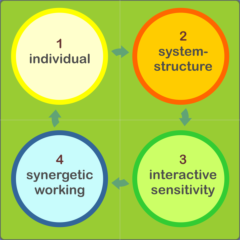Requirement Lists

How to turn your team
into the boss


- The 6 Hurdles
- The Elements
- What are the Elements
- Culture Stage Model
- Gut, Head or Herart Process
- Culture Change
- List of Feelings and Needs
- Emergency Emo-Step
- Four Step Circle
- NVC Magic Circle
- Utopia Magic Circle
- Utopia and Vision
- No-Goes and Must-Haves
- Pain Points
- Consensus
- Requirement Lists
- NVC-plus Strategy
- NVC-plus Matrix
- Discourse
- Card Set
- Download-Tool-Depot
- FAQs
- Events
- Media

6 Hurdles to Self-Organization
Chapter 22 - List of Requirements



Home / hurdle 5: toolbox / requirement lists
Successful
cooperation
is
both
a
path
and
a
goal.
Good
methods
and
tools
make
it
much
easier
for
a
team
to
organize
itself.
Encourage
your
team
to
take
the
first
steps
in
this
direction
and
experience the difference.
Are we effectively talking about requirements?

Every team, start-up, or company must overcome these six hurdles if it wants to organize itself
collegially in order to successfully manage projects from within the community.
Requirement parameters sorted by the 4 step circle
Requirement parameters, sorted according to
various aspects
Working with Requirement Lists



general requirements
objective: life-serving, organic and self-regulating commonality ∙ agility ∙ adaptability ∙ ability
to cope with complexity ∙ joie de vivre
impact: control intelligence ∙ emotional intelligence ∙ system intelligence ∙ system stability ∙
system stability
fundamentals: life ∙ awareness ∙ humanity ∙ caring ∙ peace ∙ respect ∙ community ∙ will to
cooperate ∙
further aspects: appropriateness ∙ topicality ∙ future viability ∙ error-friendliness ∙ realization ∙
common good ∙
critical aspects: unconsciousness ∙ dependency ∙ coercion ∙ dominance ∙ violence ∙ offense ∙
speechlessness ∙ bondage ∙ refusal ∙ passivity ∙ petrification ∙ conservatism ∙ competition ∙
competition ∙ merit ∙ remuneration ∙ possessiveness ∙ justice ∙ discord ∙ against each other ∙ I-
relatedness ∙ loss of ego ∙ ideology ∙ dogmatism ∙ in-the-box thinking ∙ structural and cultural
dominance ∙ habitual dominance


requirement parameters
field 1 - Individual
objective: recovery ∙ relaxation ∙ integrity ∙ stability ∙ firmness ∙ health ∙ realignment ∙ self-
reflection ∙ openness to life ∙ self-empowerment ∙ will to create ∙ responsiveness ∙ incentive ∙
utopia
impact: peace ∙ energy ∙ vitality ∙ inspiration ∙ motivation ∙ creativity ∙ movement ∙ integration ∙
internalization ∙ processing ∙ resilience ∙ containment ∙ maturity ∙ maturation ∙ self-confidence ∙
meaningfulness ∙ depth of being ∙ dignity ∙
fundamentals: security ∙ food ∙ sleep ∙ shelter ∙ independence ∙ unbound ∙ freedom ∙ space ∙
liberation ∙ undisturbedness ∙ silence ∙ spirituality ∙ system change ∙ ∙ evaluation ∙
further aspects: comfort ∙ forgiveness ∙ reconciliation ∙ mourning ∙ celebration ∙ pleasure ∙
hope ∙ security ∙ ∙ privacy ∙ diversity ∙
critical aspects: pressure ∙ stress ∙ distraction ∙ worry ∙ despair ∙ criticism ∙ self-criticism ∙
pessimism ∙ unforgiveness ∙ destructiveness ∙ unhealthy ∙ lifestyle ∙ powerlessness ∙ rage ∙
passive ∙ longing ∙ illness ∙ trauma


requirement parameters
field 2 - System Structure
objective: action space ∙ system ∙ context ∙ framework ∙ framing ∙ structure formation ∙
position ∙ positioning ∙ order ∙ orientation ∙ standards ∙ support ∙ functionality ∙
understandability ∙ planability ∙ culture of interaction ∙ stimulation ∙ damping ∙ enabling ∙
facilitation ∙ prevention
impact: references ∙ system references ∙ world reference ∙ world understanding ∙ fitting ∙
definitions ∙ standardization ∙ scaling ∙ regulation ∙ formation ∙ formatting ∙ establishment ∙
containment ∙ enclosure ∙ limitation ∙ gridding ∙ rules ∙ laws ∙ legalities ∙ status ∙ law ∙ privileges
∙ working style ∙ style of cooperation ∙ lifestyle ∙ realizability ∙ culture of togetherness ∙ positive
tension ∙ invitation ∙ reception ∙ infrastructure ∙
fundamentals: access ∙ access ∙ co-determination ∙ scope ∙ space ∙ place ∙ ∙ platform ∙
environment ∙ boundaries ∙ guidelines ∙ signposts ∙ code ∙ ∙ ∙
further aspects: preparation ∙ determination ∙ division ∙ division ∙ division ∙ expansion ∙
reduction ∙ combination ∙ structural tension ∙ cybernetics ∙ chain ∙ binding ∙ limitation ∙ frame ∙ ∙
arena ∙ stage ∙ area ∙ box ∙ marketplace ∙ land ∙ home ∙ home
critical aspects: must-haves ∙ no-gos ∙ self-centeredness ∙ lack of support ∙ lack of structure ∙
refusal ∙ lack of understanding ∙ lack of discipline ∙ fickleness ∙ indecisiveness ∙ lack of
moderation ∙ lack of boundaries ∙ crossing boundaries ∙ derailment ∙ narrowness ∙ established
cultures of dominance


requirement parameters
field 3 - Interactive Sensitivity
objective: interactive sensitivity ∙ unity ∙ involvement ∙ connectedness ∙ meta-integrity ∙
synergy ∙ flow ∙ entanglement ∙ force field generation ∙ emergence ∙
impact: stimulation ∙ powerfulness ∙ field reality ∙ system reality ∙ identity ∙ personality ∙
charisma ∙ agreement ∙ harmony ∙ trust ∙ confidence ∙ optimism ∙ serenity ∙ solidarity ∙ loyalty ∙
cohesion ∙ support ∙ mood ∙ atmosphere ∙
fundamentals: peace ∙ courage ∙ mindfulness ∙ acceptance ∙ tolerance ∙ resonance ∙ care ∙
empathy ∙ understanding ∙ arriving ∙ being seen ∙ being perceived ∙ contact ∙ belonging ∙
connection ∙ connectedness ∙
further aspects: trust ∙ presence ∙ centeredness ∙ intensity ∙ liveliness ∙ cheerfulness ∙
kindness ∙ truthfulness ∙ closeness ∙ confidence ∙ affection ∙ sympathy ∙ tenderness ∙ humor ∙
lightness ∙ patience ∙ gentleness ∙ warmth ∙ balance ∙ touch ∙ emotionality ∙ intimacy ∙ eroticism
∙ love ∙ harmony ∙ congruence ∙ appreciation ∙ adaptation ∙ autonomy ∙ autonomy ∙ distance ∙
distance ∙ sobriety
critical aspects: assault ∙ entanglement ∙ fixation ∙ isolation ∙ dissonance ∙ envy ∙ shame ∙
guilt ∙ inferiority ∙ reputation ∙ entanglement ∙ bias


requirement parameters
field 4 - Synergetic Working
objective: design ∙ implementation ∙ effectiveness ∙ growth ∙ success ∙ problem solving ∙ goal
achievement
impact: success ∙ progress ∙ feasibility ∙ productivity ∙ development ∙ healing ∙ experience ∙
play ∙ broadening understanding ∙ staging ∙
fundamentals: safety ∙ protection ∙ fairness ∙ decision ∙ responsibility ∙ ownership ∙
commitment ∙ engagement ∙ activity ∙ initiative ∙ determination ∙ exchange ∙ communication ∙
language ∙ information ∙ command ∙ comprehensibility ∙ mediation ∙ transparency ∙ clarity ∙
honesty ∙ sincerity ∙ support ∙ service ∙ cleanliness ∙ order ∙ courtesy ∙ kairos ∙ time
management ∙ timing ∙ tact ∙ punctuality ∙ priority ∙ perseverance ∙ persistence ∙ continuity ∙
resources ∙ time commitment ∙ energy commitment ∙ fitness ∙ competence ∙ knowledge ∙
expertise ∙ ability ∙ talent ∙ recognition ∙ encouragement ∙ instruction ∙ guidance ∙ learning ∙
collaboration ∙ contribution ∙
further aspects: prudence ∙ overview ∙ foresight ∙ reason ∙ logic ∙ stringency ∙ objectivity ∙
realism ∙ doubtfulness ∙ discretion ∙ role model ∙ commitment ∙ endurance ∙ robustness ∙
decency ∙ discipline ∙ backbone ∙ letting go ∙ self-control ∙ baking ∙ moderation ∙ pragmatism ∙
discretion ∙ renunciation ∙ frugality ∙ generosity ∙ balance ∙ variety ∙ quality ∙ beauty ∙ simplicity ∙
reliability ∙ participation ∙ hospitality ∙ reliability ∙ consistency ∙ performance ∙ efficiency ∙
effectiveness ∙ precision ∙ professionalism ∙ seriousness ∙ diversity ∙ challenge ∙ gradient ∙ start
∙ get through ∙ finish ∙ tactical analysis ∙ feedback ∙ leadership ∙ accountability ∙ constructive
disagreement
critical aspects: control ∙ capital ∙ money ∙ pay ∙ reward ∙ constraint ∙ enforcement ∙ struggle ∙
war ∙ level ∙ arrogance ∙ lack of ∙ skills ∙ scarcity of resources ∙ convenience ∙ ∙ stupidity ∙
naivety ∙ lack of knowledge ∙ lack of information


basic requirements
general: life ∙ awareness ∙ humanity ∙ caring ∙ peace ∙ respect ∙ community ∙ sympathy ∙
willingness to cooperate ∙
field 1 - individual: security ∙ food ∙ sleep ∙ shelter ∙ independence ∙ unbound ∙ freedom ∙
space ∙ liberation ∙ undisturbedness ∙ silence ∙ spirituality ∙ system change ∙ ∙ evaluation ∙
field 2 - system structure: access ∙ admission ∙ co-determination ∙ creative freedom ∙ space ∙
place ∙ ∙ platform ∙ environment ∙ framing ∙ boundaries ∙ guidelines ∙ signposts ∙ code ∙ must-
haves ∙ no-gos ∙ positive tension ∙ invitation ∙ inclusion ∙ exclusion ∙ rules ∙ laws ∙ regularities ∙
field 3 - interactive sensitivity: peace ∙ courage ∙ mindfulness ∙ acceptance ∙ tolerance ∙
resonance ∙ care ∙ empathy ∙ understanding ∙ arriving ∙ being seen ∙ being perceived ∙ being in
common ∙ contact ∙ belonging ∙ connection ∙ connectedness ∙ truth ∙
field 4 - synergetic design: security ∙ protection ∙ fairness ∙ consensus ∙ decision ∙
responsibility ∙ ownership ∙ commitment ∙ engagement ∙ activity ∙ initiative ∙ determination ∙
exchange ∙ communication ∙ discourse ∙ language ∙ information ∙ documentation ∙ command ∙
comprehensibility ∙ mediation ∙ transparency ∙ clarity ∙ honesty ∙ sincerity ∙ support ∙ service ∙
cleanliness ∙ order ∙ courtesy ∙ kairos ∙ time management ∙ timing ∙ tact ∙ punctuality ∙ priority ∙
perseverance ∙ persistence ∙ continuity ∙ ∙ completion ∙ resources ∙ time commitment ∙ energy
commitment ∙ fitness ∙ competence ∙ knowledge ∙ expertise ∙ skill ∙ talent ∙ recognition ∙
encouragement ∙ instruction ∙ guidance ∙ learning ∙ collaboration ∙ contribution


parameters in relation to impact
general: control intelligence ∙ emotional ∙ intelligence ∙ system intelligence ∙ system stability ∙
field 1 - individual: peace ∙ energy ∙ vitality ∙ inspiration ∙ motivation ∙ creativity ∙ movement ∙
integration ∙ internalization ∙ processing ∙ resilience ∙ containment ∙ maturity ∙ maturation ∙ self-
confidence ∙ meaningfulness ∙ depth of being ∙ dignity ∙
field 2 - system structure: system ∙ references ∙ system references ∙ world reference ∙ world
understanding ∙ fit ∙ definitions ∙ standardization ∙ scaling ∙ regulation ∙ formation ∙ formatting ∙
establishment ∙ containment ∙ enclosure ∙ boundary ∙ grid ∙ status ∙ law ∙ privileges ∙ working
style ∙ style of cooperation ∙ lifestyle ∙ realizability ∙ culture of togetherness ∙ infrastructure ∙
field 3 - interactive sensitivity: alignment ∙ stimulation ∙ power ∙ field reality ∙ system reality ∙
mood ∙ atmosphere ∙ identity ∙ personality ∙ charisma ∙ harmony ∙ trust ∙ confidence ∙ optimism
∙ composure ∙ solidarity ∙ loyalty ∙ cohesion ∙ support ∙
field 4 - synergetic design: progress ∙ feasibility ∙ productivity ∙ development ∙ healing ∙
experience ∙ play ∙ broadening understanding


further parameters
general: appropriateness ∙ topicality ∙ future viability ∙ faliure-friendliness ∙ realization ∙
common good ∙
field 1 - individual: comfort ∙ security ∙ forgiveness ∙ reconciliation ∙ mourning ∙ celebration ∙
pleasure ∙ hope ∙ privacy ∙ diversity ∙ variety
field 2 - system structure: preparation ∙ determination ∙ division ∙ division ∙ division ∙
expansion ∙ reduction ∙ combination ∙ structural tension ∙ limitation ∙ binding ∙ frame ∙ ∙ area ∙
box ∙ stage ∙ arena ∙ marketplace ∙ home ∙ home ∙ country ∙ world
field 3 - interactive sensitivity: trust ∙ presence ∙ centeredness ∙ intensity ∙ liveliness ∙
cheerfulness ∙ kindness ∙ truthfulness ∙ closeness ∙ confidence ∙ affection ∙ sympathy ∙
tenderness ∙ humor ∙ lightness ∙ patience ∙ gentleness ∙ warmth ∙ balance ∙ touch ∙
emotionality ∙ intimacy ∙ eroticism ∙ love ∙ harmony ∙ congruence ∙ appreciation ∙ adaptation ∙
agreement ∙ autonomy ∙ independence ∙ distance ∙ distance ∙ sobriety ∙ difference ∙ diversity
field 4 - synergetic design: prudence ∙ overview ∙ far-sightedness ∙ reason ∙ logic ∙
stringency ∙ objectivity ∙ realism ∙ ability to doubt ∙ discretion ∙ role model ∙ commitment ∙
endurance ∙ robustness ∙ decency ∙ discipline ∙ backbone ∙ letting go ∙ self-control ∙ baking ∙
moderation ∙ pragmatism ∙ discretion ∙ renunciation ∙ frugality ∙ generosity ∙ balance ∙ variety ∙
quality ∙ beauty ∙ simplicity ∙ reliability ∙ participation ∙ hospitality ∙ reliability ∙ consistency ∙
performance ∙ efficiency ∙ effectiveness ∙ precision ∙ professionalism ∙ seriousness ∙ staging ∙
diversity ∙ challenge ∙ starting ∙ getting through ∙ completing ∙ finishing ∙ tactical analysis ∙
feedback ∙ leadership ∙ ∙ lateral leadership ∙ accountability ∙ constructive disagreement


critical parameters
general: unconsciousness ∙ dependence ∙ coercion ∙ dominance ∙ violence ∙ insult ∙
speechlessness ∙ bondage ∙ denial ∙ passivity ∙ petrification ∙ conservatism ∙ competition ∙
competition ∙ merit ∙ remuneration ∙ possessive thinking ∙ justice ∙ conflict ∙ against each other
∙ i-relatedness ∙ loss of ego ∙ ideology ∙ dogmatism ∙ in-the-box thinking ∙ structural ∙ and ∙
cultural dominance ∙ habitual dominance
field 1 - individual: pressure ∙ stress ∙ distraction ∙ worry ∙ despair ∙ deficit thinking ∙
pessimism ∙ unforgiveness ∙ destructiveness ∙ unhealthy ∙ lifestyle ∙ powerlessness ∙ rage ∙
passive ∙ longing ∙ illness ∙ trauma
field 2 - system structure: self-centeredness ∙ narrowness ∙ enmeshment ∙ lack of support ∙
lack of structure ∙ denial ∙ lack of understanding ∙ lack of discipline ∙ fickleness ∙
indecisiveness ∙ lack of moderation ∙ lack of boundaries ∙ transgression of boundaries ∙
derailment ∙ dissonant environmental systems ∙ dark corners
field 3 - interactive sensitivity: assault ∙ entanglement ∙ fixation ∙ isolation ∙ dissonance ∙
envy ∙ shame ∙ guilt ∙ inferiority ∙ reputation ∙ reverence ∙ adoration ∙ ∙ entanglement ∙ bias ∙
unreconciliation ∙ enemy images
field 4 - synergetic design: control ∙ capital ∙ money ∙ payment ∙ reward ∙ compromise ∙
predicament ∙ enforcement ∙ struggle ∙ war ∙ level ∙ conceit ∙ lack of ∙ skills ∙ scarcity of
resources ∙ scarcity of time ∙ shifting priorities ∙ fickleness ∙ abandonment ∙ disparity ∙
convenience ∙ ∙ stupidity ∙ naivety ∙ lack of knowledge ∙ lack of information ∙ no suitable
tools/means ∙ hidden interests ∙ black/white thinking thinking ∙ final longing for goals


parameters in relation to the objective
general: life-serving, organic and self-regulating commonality ∙ agility ∙ adaptability ∙ capacity
for complexity ∙ joie de vivre
field 1 - individual: recovery ∙ relaxation ∙ integrity ∙ stability ∙ firmness ∙ health ∙ reorientation
∙ future orientation ∙ self-reflection ∙ self-clarification ∙ conflict clarification ∙ openness to life ∙
self-empowerment ∙ will to shape ∙ responsiveness ∙ incentive ∙ utopia
field 2 - system structure: action space ∙ context ∙ framework ∙ structure ∙ position ∙
positioning ∙ order ∙ orientation ∙ standards ∙ interfaces ∙ support ∙ functionality ∙
understandability ∙ planability ∙ culture of interaction ∙ stimulation ∙ attenuation ∙ enabling ∙
facilitation ∙ prevention
field 3 - interactive sensitivity: interactive sensitivity ∙ unity ∙ integration ∙ connectedness ∙
team integrity ∙ meta-integrity ∙ synergy ∙ flow ∙ entanglement ∙ force field generation ∙
emergence ∙
field 4 - synergetic design: success ∙ design ∙ implementation ∙ effectiveness ∙ experience of
effectiveness ∙ growth ∙ problem solving ∙ goal achievement ∙ realization ∙ enhancement


About dealing with requirement words
In classic NVC, the requests of the individuals, which have arisen from a mostly unpleasant
situation, are combined to form a common strategy. In NVC-plus, the utopias of the
individuals are combined in a suitable system to form common visions, which are then
turned into strategies and then into tactical implementation. At the same time, the
potentials of the individuals intertwine to form a potential field.
1.
Precise words give the language its efficiency. The word lists enable quick point
diagnoses. These point diagnoses are not anchored ∙ in concrete situations/actions,
but in abstract qualities/needs. because of the focus on the utopia/vision, NVC-plus
users are less inclined to refer to past situations and thus perhaps indulge in thoughts
of guilt and reproaches but can work constructively and creatively on the future in a
very targeted way. This is familiar in classic NVC. It refers to a past situation, usually a
crisis situation, but then derives timeless needs (abstract unfulfilled needs) from it,
which it wants to see fulfilled as qualities in the future. In the end, the NVC request
refers to this. With NVC-plus, you don't need past problems to build creative and
constructive quality fields together. There is also no need for personal needs. based on
the parameters, it is easy to recognize the requirements for qualities and potentials
that are needed to achieve the goal.
2.
The word lists also prevent destructive speechlessness.
3.
Intelligent maintenance of interactive fields/systems: The listed parameters/qualities
are interconnected. (See Schulz von Thun's square of values and growth). Qualities
have balancing qualities, which must also be sufficiently present so that there is no
one-sided exaggeration. In general, it can be said that the qualities are interrelated and
we can therefore speak of quality fields. Such quality fields are needed for good
cooperation. The targeted enhancement of individual qualities plays a relevant role in
every improvement, so that the field as a whole becomes stronger and more effective
with regard to the goal to be achieved. However, the field must also be tailored to the
team members, as they use the field for their performance and design. Fields that are
too strong would cause more problems than benefits.
4.
This list can be used for decisions in larger groups, e.g. for a mixture of Conver-gent
Facilitation and Systemic Consensus. In small groups of 5-6 people each, everyone
considers what qualities the joint solution should have and then envisions a concrete
solution proposal. The proposals are briefly presented in plenary, whereupon the small
groups withdraw again to further develop or reject their proposed solution based on
the proposals of others. The presentation is repeated. If you like, you can do a skeptics'
tour in which the biggest skeptics go through the small groups and are heard with
arguments. Once again, the proposals can be polished up or rejected. The proposals
are then presented and discussed on the same day or on one of the following days
after a little more time to mature.
The NVC-plus requirements list enables the list to be used quickly, as it is often only
necessary to decide on the current NVC-plus field.


Requirement Lists


d) Requirement Lists





Chapter 22 - List of Requirements


- The 6 Hurdles
- The Elements
- What are the Elements
- Culture Stage Model
- Gut, Head or Herart Process
- Culture Change
- List of Feelings and Needs
- Requirement Lists
- NVC Magic Circle
- Utopia Magic Circle
- Emergency Emo-Step
- Four Step Circle
- Utopia and Vision
- No-Goes and Must-Haves
- Pain Points
- Consensus
- NVC-plus Strategy
- NVC-plus Matrix
- Discourse
- Card Set
- Download-Tool-Depot
- FAQs
- Events
- Media
Successful
cooperation
is
both
a
path
and
a
goal.
Good
methods
and
tools
make
it
much
easier
for
a
team
to
organize
itself.
Encourage
your
team
to
take
the
first
steps
in
this
direction
and
experience
the
difference.
Are we effectively discussing the
requirements of the project?
Requirement parameters sorted by the
4 step circle
Requirement parameters, sorted
according to various aspects
Working with Requirement Lists




general requirements
objective: life-serving, organic and self-regulating commonality ∙
agility ∙ adaptability ∙ ability to cope with complexity ∙ joie de vivre
impact: control intelligence ∙ emotional intelligence ∙ system
intelligence ∙ system stability ∙ system stability
fundamentals: life ∙ awareness ∙ humanity ∙ caring ∙ peace ∙
respect ∙ community ∙ will to cooperate ∙
further aspects: appropriateness ∙ topicality ∙ future viability ∙ error-
friendliness ∙ realization ∙ common good ∙
critical aspects: unconsciousness ∙ dependency ∙ coercion ∙
dominance ∙ violence ∙ offense ∙ speechlessness ∙ bondage ∙
refusal ∙ passivity ∙ petrification ∙ conservatism ∙ competition ∙
competition ∙ merit ∙ remuneration ∙ possessiveness ∙ justice ∙
discord ∙ against each other ∙ I-relatedness ∙ loss of ego ∙ ideology ∙
dogmatism ∙ in-the-box thinking ∙ structural and cultural dominance
∙ habitual dominance


requirement parameters
field 1 - Individual
objective: recovery ∙ relaxation ∙ integrity ∙ stability ∙ firmness ∙
health ∙ realignment ∙ self-reflection ∙ openness to life ∙ self-
empowerment ∙ will to create ∙ responsiveness ∙ incentive ∙
utopia
impact: peace ∙ energy ∙ vitality ∙ inspiration ∙ motivation ∙
creativity ∙ movement ∙ integration ∙ internalization ∙ processing ∙
resilience ∙ containment ∙ maturity ∙ maturation ∙ self-confidence ∙
meaningfulness ∙ depth of being ∙ dignity ∙
fundamentals: security ∙ food ∙ sleep ∙ shelter ∙ independence ∙
unbound ∙ freedom ∙ space ∙ liberation ∙ undisturbedness ∙
silence ∙ spirituality ∙ system change ∙ ∙ evaluation ∙
further aspects: comfort ∙ forgiveness ∙ reconciliation ∙ mourning
∙ celebration ∙ pleasure ∙ hope ∙ security ∙ ∙ privacy ∙ diversity ∙
critical aspects: pressure ∙ stress ∙ distraction ∙ worry ∙ despair ∙
criticism ∙ self-criticism ∙ pessimism ∙ unforgiveness ∙
destructiveness ∙ unhealthy ∙ lifestyle ∙ powerlessness ∙ rage ∙
passive ∙ longing ∙ illness ∙ trauma


requirement parameters
field 2 - System Structure
objective: action space ∙ system ∙ context ∙ framework ∙ framing
∙ structure formation ∙ position ∙ positioning ∙ order ∙ orientation ∙
standards ∙ support ∙ functionality ∙ understandability ∙ planability
∙ culture of interaction ∙ stimulation ∙ damping ∙ enabling ∙
facilitation ∙ prevention
impact: references ∙ system references ∙ world reference ∙ world
understanding ∙ fitting ∙ definitions ∙ standardization ∙ scaling ∙
regulation ∙ formation ∙ formatting ∙ establishment ∙ containment ∙
enclosure ∙ limitation ∙ gridding ∙ rules ∙ laws ∙ legalities ∙ status ∙
law ∙ privileges ∙ working style ∙ style of cooperation ∙ lifestyle ∙
realizability ∙ culture of togetherness ∙ positive tension ∙ invitation
∙ reception ∙ infrastructure ∙
fundamentals: access ∙ access ∙ co-determination ∙ scope ∙
space ∙ place ∙ ∙ platform ∙ environment ∙ boundaries ∙ guidelines
∙ signposts ∙ code ∙ ∙ ∙
further aspects: preparation ∙ determination ∙ division ∙ division ∙
division ∙ expansion ∙ reduction ∙ combination ∙ structural tension
∙ cybernetics ∙ chain ∙ binding ∙ limitation ∙ frame ∙ ∙ arena ∙ stage
∙ area ∙ box ∙ marketplace ∙ land ∙ home ∙ home
critical aspects: must-haves ∙ no-gos ∙ self-centeredness ∙ lack
of support ∙ lack of structure ∙ refusal ∙ lack of understanding ∙
lack of discipline ∙ fickleness ∙ indecisiveness ∙ lack of
moderation ∙ lack of boundaries ∙ crossing boundaries ∙
derailment ∙ narrowness ∙ established cultures of dominance


requirement parameters
field 3 - Interactive Sensitivity
objective: interactive sensitivity ∙ unity ∙ involvement ∙
connectedness ∙ meta-integrity ∙ synergy ∙ flow ∙ entanglement ∙
force field generation ∙ emergence ∙
impact: stimulation ∙ powerfulness ∙ field reality ∙ system reality ∙
identity ∙ personality ∙ charisma ∙ agreement ∙ harmony ∙ trust ∙
confidence ∙ optimism ∙ serenity ∙ solidarity ∙ loyalty ∙ cohesion ∙
support ∙ mood ∙ atmosphere ∙
fundamentals: peace ∙ courage ∙ mindfulness ∙ acceptance ∙
tolerance ∙ resonance ∙ care ∙ empathy ∙ understanding ∙ arriving
∙ being seen ∙ being perceived ∙ contact ∙ belonging ∙ connection
∙ connectedness ∙
further aspects: trust ∙ presence ∙ centeredness ∙ intensity ∙
liveliness ∙ cheerfulness ∙ kindness ∙ truthfulness ∙ closeness ∙
confidence ∙ affection ∙ sympathy ∙ tenderness ∙ humor ∙
lightness ∙ patience ∙ gentleness ∙ warmth ∙ balance ∙ touch ∙
emotionality ∙ intimacy ∙ eroticism ∙ love ∙ harmony ∙ congruence ∙
appreciation ∙ adaptation ∙ autonomy ∙ autonomy ∙ distance ∙
distance ∙ sobriety
critical aspects: assault ∙ entanglement ∙ fixation ∙ isolation ∙
dissonance ∙ envy ∙ shame ∙ guilt ∙ inferiority ∙ reputation ∙
entanglement ∙ bias


requirement parameters
field 4 - Synergetic Working
objective: design ∙ implementation ∙ effectiveness ∙ growth ∙
success ∙ problem solving ∙ goal achievement
impact: success ∙ progress ∙ feasibility ∙ productivity ∙
development ∙ healing ∙ experience ∙ play ∙ broadening
understanding ∙ staging ∙
fundamentals: safety ∙ protection ∙ fairness ∙ decision ∙
responsibility ∙ ownership ∙ commitment ∙ engagement ∙ activity ∙
initiative ∙ determination ∙ exchange ∙ communication ∙ language ∙
information ∙ command ∙ comprehensibility ∙ mediation ∙
transparency ∙ clarity ∙ honesty ∙ sincerity ∙ support ∙ service ∙
cleanliness ∙ order ∙ courtesy ∙ kairos ∙ time management ∙ timing
∙ tact ∙ punctuality ∙ priority ∙ perseverance ∙ persistence ∙
continuity ∙ resources ∙ time commitment ∙ energy commitment ∙
fitness ∙ competence ∙ knowledge ∙ expertise ∙ ability ∙ talent ∙
recognition ∙ encouragement ∙ instruction ∙ guidance ∙ learning ∙
collaboration ∙ contribution ∙
further aspects: prudence ∙ overview ∙ foresight ∙ reason ∙ logic ∙
stringency ∙ objectivity ∙ realism ∙ doubtfulness ∙ discretion ∙ role
model ∙ commitment ∙ endurance ∙ robustness ∙ decency ∙
discipline ∙ backbone ∙ letting go ∙ self-control ∙ baking ∙
moderation ∙ pragmatism ∙ discretion ∙ renunciation ∙ frugality ∙
generosity ∙ balance ∙ variety ∙ quality ∙ beauty ∙ simplicity ∙
reliability ∙ participation ∙ hospitality ∙ reliability ∙ consistency ∙
performance ∙ efficiency ∙ effectiveness ∙ precision ∙
professionalism ∙ seriousness ∙ diversity ∙ challenge ∙ gradient ∙
start ∙ get through ∙ finish ∙ tactical analysis ∙ feedback ∙
leadership ∙ accountability ∙ constructive disagreement
critical aspects: control ∙ capital ∙ money ∙ pay ∙ reward ∙
constraint ∙ enforcement ∙ struggle ∙ war ∙ level ∙ arrogance ∙ lack
of ∙ skills ∙ scarcity of resources ∙ convenience ∙ ∙ stupidity ∙
naivety ∙ lack of knowledge ∙ lack of information


basic requirements
general: life ∙ awareness ∙ humanity ∙ caring ∙ peace ∙ respect ∙
community ∙ sympathy ∙ willingness to cooperate ∙
field 1 - individual: security ∙ food ∙ sleep ∙ shelter ∙
independence ∙ unbound ∙ freedom ∙ space ∙ liberation ∙
undisturbedness ∙ silence ∙ spirituality ∙ system change ∙ ∙
evaluation ∙
field 2 - system structure: access ∙ admission ∙ co-
determination ∙ creative freedom ∙ space ∙ place ∙ ∙ platform ∙
environment ∙ framing ∙ boundaries ∙ guidelines ∙ signposts ∙
code ∙ must- haves ∙ no-gos ∙ positive tension ∙ invitation ∙
inclusion ∙ exclusion ∙ rules ∙ laws ∙ regularities ∙
field 3 - interactive sensitivity: peace ∙ courage ∙ mindfulness ∙
acceptance ∙ tolerance ∙ resonance ∙ care ∙ empathy ∙
understanding ∙ arriving ∙ being seen ∙ being perceived ∙ being in
common ∙ contact ∙ belonging ∙ connection ∙ connectedness ∙
truth ∙
field 4 - synergetic design: security ∙ protection ∙ fairness ∙
consensus ∙ decision ∙ responsibility ∙ ownership ∙ commitment ∙
engagement ∙ activity ∙ initiative ∙ determination ∙ exchange ∙
communication ∙ discourse ∙ language ∙ information ∙
documentation ∙ command ∙ comprehensibility ∙ mediation ∙
transparency ∙ clarity ∙ honesty ∙ sincerity ∙ support ∙ service ∙
cleanliness ∙ order ∙ courtesy ∙ kairos ∙ time management ∙ timing
∙ tact ∙ punctuality ∙ priority ∙ perseverance ∙ persistence ∙
continuity ∙ ∙ completion ∙ resources ∙ time commitment ∙ energy
commitment ∙ fitness ∙ competence ∙ knowledge ∙ expertise ∙ skill
∙ talent ∙ recognition ∙ encouragement ∙ instruction ∙ guidance ∙
learning ∙ collaboration ∙ contribution


parameters in relation to impact
general: control intelligence ∙ emotional ∙ intelligence ∙ system
intelligence ∙ system stability ∙
field 1 - individual: peace ∙ energy ∙ vitality ∙ inspiration ∙
motivation ∙ creativity ∙ movement ∙ integration ∙ internalization ∙
processing ∙ resilience ∙ containment ∙ maturity ∙ maturation ∙
self-confidence ∙ meaningfulness ∙ depth of being ∙ dignity ∙
field 2 - system structure: system ∙ references ∙ system
references ∙ world reference ∙ world understanding ∙ fit ∙
definitions ∙ standardization ∙ scaling ∙ regulation ∙ formation ∙
formatting ∙ establishment ∙ containment ∙ enclosure ∙ boundary ∙
grid ∙ status ∙ law ∙ privileges ∙ working style ∙ style of cooperation
∙ lifestyle ∙ realizability ∙ culture of togetherness ∙ infrastructure ∙
field 3 - interactive sensitivity: alignment ∙ stimulation ∙ power ∙
field reality ∙ system reality ∙ mood ∙ atmosphere ∙ identity ∙
personality ∙ charisma ∙ harmony ∙ trust ∙ confidence ∙ optimism ∙
composure ∙ solidarity ∙ loyalty ∙ cohesion ∙ support ∙
field 4 - synergetic design: progress ∙ feasibility ∙ productivity ∙
development ∙ healing ∙ experience ∙ play ∙ broadening
understanding


further parameters
general: appropriateness ∙ topicality ∙ future viability ∙ faliure-
friendliness ∙ realization ∙ common good ∙
field 1 - individual: comfort ∙ security ∙ forgiveness ∙
reconciliation ∙ mourning ∙ celebration ∙ pleasure ∙ hope ∙ privacy
∙ diversity ∙ variety
field 2 - system structure: preparation ∙ determination ∙ division
∙ division ∙ division ∙ expansion ∙ reduction ∙ combination ∙
structural tension ∙ limitation ∙ binding ∙ frame ∙ ∙ area ∙ box ∙
stage ∙ arena ∙ marketplace ∙ home ∙ home ∙ country ∙ world
field 3 - interactive sensitivity: trust ∙ presence ∙ centeredness
∙ intensity ∙ liveliness ∙ cheerfulness ∙ kindness ∙ truthfulness ∙
closeness ∙ confidence ∙ affection ∙ sympathy ∙ tenderness ∙
humor ∙ lightness ∙ patience ∙ gentleness ∙ warmth ∙ balance ∙
touch ∙ emotionality ∙ intimacy ∙ eroticism ∙ love ∙ harmony ∙
congruence ∙ appreciation ∙ adaptation ∙ agreement ∙ autonomy ∙
independence ∙ distance ∙ distance ∙ sobriety ∙ difference ∙
diversity
field 4 - synergetic design: prudence ∙ overview ∙ far-
sightedness ∙ reason ∙ logic ∙ stringency ∙ objectivity ∙ realism ∙
ability to doubt ∙ discretion ∙ role model ∙ commitment ∙
endurance ∙ robustness ∙ decency ∙ discipline ∙ backbone ∙ letting
go ∙ self-control ∙ baking ∙ moderation ∙ pragmatism ∙ discretion ∙
renunciation ∙ frugality ∙ generosity ∙ balance ∙ variety ∙ quality ∙
beauty ∙ simplicity ∙ reliability ∙ participation ∙ hospitality ∙
reliability ∙ consistency ∙ performance ∙ efficiency ∙ effectiveness ∙
precision ∙ professionalism ∙ seriousness ∙ staging ∙ diversity ∙
challenge ∙ starting ∙ getting through ∙ completing ∙ finishing ∙
tactical analysis ∙ feedback ∙ leadership ∙ ∙ lateral leadership ∙
accountability ∙ constructive disagreement


critical parameters
general: unconsciousness ∙ dependence ∙ coercion ∙ dominance
∙ violence ∙ insult ∙ speechlessness ∙ bondage ∙ denial ∙ passivity
∙ petrification ∙ conservatism ∙ competition ∙ competition ∙ merit ∙
remuneration ∙ possessive thinking ∙ justice ∙ conflict ∙ against
each other ∙ i-relatedness ∙ loss of ego ∙ ideology ∙ dogmatism ∙
in-the-box thinking ∙ structural ∙ and ∙ cultural dominance ∙
habitual dominance
field 1 - individual: pressure ∙ stress ∙ distraction ∙ worry ∙
despair ∙ deficit thinking ∙ pessimism ∙ unforgiveness ∙
destructiveness ∙ unhealthy ∙ lifestyle ∙ powerlessness ∙ rage ∙
passive ∙ longing ∙ illness ∙ trauma
field 2 - system structure: self-centeredness ∙ narrowness ∙
enmeshment ∙ lack of support ∙ lack of structure ∙ denial ∙ lack of
understanding ∙ lack of discipline ∙ fickleness ∙ indecisiveness ∙
lack of moderation ∙ lack of boundaries ∙ transgression of
boundaries ∙ derailment ∙ dissonant environmental systems ∙
dark corners
field 3 - interactive sensitivity: assault ∙ entanglement ∙ fixation
∙ isolation ∙ dissonance ∙ envy ∙ shame ∙ guilt ∙ inferiority ∙
reputation ∙ reverence ∙ adoration ∙ ∙ entanglement ∙ bias ∙
unreconciliation ∙ enemy images
field 4 - synergetic design: control ∙ capital ∙ money ∙ payment ∙
reward ∙ compromise ∙ predicament ∙ enforcement ∙ struggle ∙
war ∙ level ∙ conceit ∙ lack of ∙ skills ∙ scarcity of resources ∙
scarcity of time ∙ shifting priorities ∙ fickleness ∙ abandonment ∙
disparity ∙ convenience ∙ ∙ stupidity ∙ naivety ∙ lack of knowledge ∙
lack of information ∙ no suitable tools/means ∙ hidden interests ∙
black/white thinking thinking ∙ final longing for goals


parameters in relation to the objective
general: life-serving, organic and self-regulating commonality ∙
agility ∙ adaptability ∙ capacity for complexity ∙ joie de vivre
field 1 - individual: recovery ∙ relaxation ∙ integrity ∙ stability ∙
firmness ∙ health ∙ reorientation ∙ future orientation ∙ self-
reflection ∙ self-clarification ∙ conflict clarification ∙ openness to
life ∙ self-empowerment ∙ will to shape ∙ responsiveness ∙
incentive ∙ utopia
field 2 - system structure: action space ∙ context ∙ framework ∙
structure ∙ position ∙ positioning ∙ order ∙ orientation ∙ standards ∙
interfaces ∙ support ∙ functionality ∙ understandability ∙ planability
∙ culture of interaction ∙ stimulation ∙ attenuation ∙ enabling ∙
facilitation ∙ prevention
field 3 - interactive sensitivity: interactive sensitivity ∙ unity ∙
integration ∙ connectedness ∙ team integrity ∙ meta-integrity ∙
synergy ∙ flow ∙ entanglement ∙ force field generation ∙
emergence ∙
field 4 - synergetic design: success ∙ design ∙ implementation ∙
effectiveness ∙ experience of effectiveness ∙ growth ∙ problem
solving ∙ goal achievement ∙ realization ∙ enhancement


About dealing with requirement words
In classic NVC, the requests of the individuals, which have
arisen from a mostly unpleasant situation, are combined to
form a common strategy. In NVC-plus, the utopias of the
individuals are combined in a suitable system to form
common visions, which are then turned into strategies and
then into tactical implementation. At the same time, the
potentials of the individuals intertwine to form a potential
field.
1.
Precise words give the language its efficiency. The word
lists enable quick point diagnoses. These point diagnoses
are not anchored ∙ in concrete situations/actions, but in
abstract qualities/needs. because of the focus on the
utopia/vision, NVC-plus users are less inclined to refer to
past situations and thus perhaps indulge in thoughts of
guilt and reproaches but can work constructively and
creatively on the future in a very targeted way. This is
familiar in classic NVC. It refers to a past situation, usually
a crisis situation, but then derives timeless needs
(abstract unfulfilled needs) from it, which it wants to see
fulfilled as qualities in the future. In the end, the NVC
request refers to this. With NVC-plus, you don't need past
problems to build creative and constructive quality fields
together. There is also no need for personal needs. based
on the parameters, it is easy to recognize the
requirements for qualities and potentials that are needed
to achieve the goal.
2.
The word lists also prevent destructive speechlessness.
3.
Intelligent maintenance of interactive fields/systems: The
listed parameters/qualities are interconnected. (See
Schulz von Thun's square of values and growth). Qualities
have balancing qualities, which must also be sufficiently
present so that there is no one-sided exaggeration. In
general, it can be said that the qualities are interrelated
and we can therefore speak of quality fields. Such quality
fields are needed for good cooperation. The targeted
enhancement of individual qualities plays a relevant role
in every improvement, so that the field as a whole
becomes stronger and more effective with regard to the
goal to be achieved. However, the field must also be
tailored to the team members, as they use the field for
their performance and design. Fields that are too strong
would cause more problems than benefits.
4.
This list can be used for decisions in larger groups, e.g.
for a mixture of Conver-gent Facilitation and Systemic
Consensus. In small groups of 5-6 people each, everyone
considers what qualities the joint solution should have
and then envisions a concrete solution proposal. The
proposals are briefly presented in plenary, whereupon
the small groups withdraw again to further develop or
reject their proposed solution based on the proposals of
others. The presentation is repeated. If you like, you can
do a skeptics' tour in which the biggest skeptics go
through the small groups and are heard with arguments.
Once again, the proposals can be polished up or rejected.
The proposals are then presented and discussed on the
same day or on one of the following days after a little
more time to mature.
The NVC-plus requirements list enables the list to be used
quickly, as it is often only necessary to decide on the current
NVC-plus field.























































































